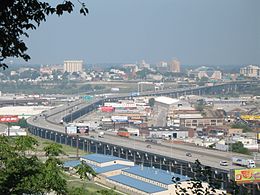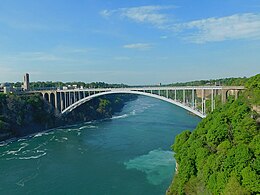 | |
| Formerly |
|
|---|---|
| Company type | Privately held company |
| Industry | Infrastructure engineering |
| Founded | 1887; 138 years ago (1887) in Kansas City, Missouri |
| Founder | John Alexander Low Waddell |
| Headquarters | New York City, United States |
| Key people | CEO Sean A. Bluni, PE |
| Services |
|
| Website | hardestyhanover |
H&H is an American infrastructure engineering company specializing in the design and management of bridges and other transportation and architecture projects. The firm was founded in 1887 by John Alexander Low Waddell, a structural engineer who pioneered the design of large-scale moveable bridge. Originally incorporated in Kansas City, Missouri as J.A.L. Waddell, Consulting Engineer, the company was renamed throughout the early 20th century as Waddell added junior partners to the organization. In 1920, the firm moved its headquarters to New York City, where it would go on to design many important bridges int the area, such as Newark Bay Bridge (rail), the original Goethals Bridge, and Marine Parkway Bridge.
In recent decades the company has expanded its footprint to the fields of highway design and movable architecture, contributing to projects like U.S. Bank Stadium, the New York City Shed, the redevelopment of LaGuardia Airport, and other major interchanges of highways in New York City.
History
J.A.L. Waddell, Consulting Engineer (1887)

Waddell's private consultancy gained a reputation for "daring and unusual structures" with a modern approach to the bridge design, and construction process. The company's first project, the Illinois Central Missouri River Bridge, was a swing bridge designed by Waddell in 1893 and built across the Missouri River. At the time of its construction, it was the longest swing bridge in the world with a moving span of 520 ft (158.5 m).
A year later in 1894, Waddell designed the South Halsted Street Bridge over the Chicago River. As the world's first major vertical-lift bridge, the project had a significant impact on infrastructure design.
Waddell and Hedrick, Consulting Engineers (1899)
In 1899 Waddell promoted his chief draftsman Ira G. Hedrick to partner, renaming the firm Waddell & Hedrick. This partnership produced what would become the company's oldest design still in operation as of 2021: the New Westminster Bridge.
Waddell and Harrington (1907)

In 1907 the company became known as Waddell & Harrington when Waddell partnered with John L. Harrington, former Chief Engineer of the Locomotive & Machine Company of Montreal. While still headquartered in Kansas City, the firm also maintained offices in Portland, Oregon, and Vancouver, British Columbia.
In 1908 Waddell & Harrington patented an improved Bascule bridge. That summer they also filed the first of several patents for improvements to Waddell's earlier vertical-lift bridge designs,
In their time together, Waddell & Harrington designed at least thirty highway and railroad bridges, and four remain in operation as of 2021 (three of them in the iconic vertical-lift style): Hawthorne Bridge (1910), ASB Bridge (1911), Colorado St. (Arroyo Seco) Bridge (1913), and Murray Morgan Bridge (1913).
In 1914, Waddell & Harrington announced the dissolution of their partnership effective in July of the following year. Harrington would continue working with his colleague, draftsman Frank Cortelyou, in new firm known as Harrington, Howard & Ash (which would eventually become HNTB).

Waddell and Son (1915)
In 1915, Waddell promoted Needham Everett to junior partner, renaming the firm Waddell & Son. That same year, they celebrated the opening of the LS&MS Railway Bridge No. 6 in Chicago, IL, and a satellite office in New York City, though the younger Waddell reportedly stayed behind to manage the Kansas City office through at least 1918. In 1916, Shortridge Hardesty (who had previously been hand-picked to join the firm shortly after his 1908 graduation from Rensselaer Polytechnic Institute) was promoted to Designing Engineer.
The firm did well, receiving many contracts during the post-war economic revival, and the New York office became its headquarters in 1920.
Needham Everett died in 1927.
Waddell and Hardesty (1927)

After the death of his son, Waddell continued to lead the firm, promoting Hardesty to Partner. They continued to create important bridges; the CRRNJ Newark Bay Bridge (1926), original Goethals Bridge and Outerbridge Crossing (1928), and Marine Parkway Bridge (1937). In 1931 Waddell was personally honored with the American Association of Engineers' Clausen Gold Medal award for "distinguished service to the engineering profession", and again in 1937 with the American Society of Civil Engineers (ASCE) Norman Medal. He died in 1938 at the age of 84, leaving Hardesty to run the company.
Hardesty & Hanover (1945)

In 1945, Hardesty took on Clinton Hanover (former Chief of the New York City Bureau of Bridge Design) as a partner. The duo's leadership saw completion of the Rainbow Bridge in 1941. Spanning Niagara Falls, the structure was honored with the 1941 American Institute of Steel Construction (AISC) 1st Place "Class A" Prize Bridge Award for beauty.
In the following decades, the company developed many other moveable and fixed bridges across New York State and beyond. One of its earliest forays into moveable architecture was an amusement ride for the 1964 New York World's Fair that took the form of a Ferris wheel, known as the Uniroyal Giant Tire.
Among H&H's first highway projects was the Interstate 80 and Route 19 interchange in Paterson, New Jersey. The company has continued to design roadways, most recently the reconstruction of LaGuardia Airport and Kew Gardens Interchange. The latter project features NEXT Beam technology in one of its 15 bridges. The firm also designed the replacement William Cullen Bryant Viaduct between Flower Hill & Roslyn, New York.


In 2022, Hardesty & Hanover unveiled a new corporate brand & logo that complements recent company growth. Going forward, branding will identify the firm as H&H, with Hardesty & Hanover, LLC remaining the legal name. In 2022, the firm also received notification from the United States Patent and Trademark Office that the firm had been awarded a trademark designation for the key phrase “Designed to Amaze, Engineered to Last®” which had been used across the firm for more than four years. While the firm and its employees have multiple patents, this is the first trademark awarded to H&H. With 600 employees, the firm has 33 offices in the US and the UK.
Notable projects
References
- ^ Weingardt, P.E., Richard (2007). "John Alexander Low Waddell: Genius of Moveable Bridges" (PDF). STRUCTURE Magazine. Feb. 2007. Retrieved May 30, 2021.
- White, James T., ed. (1904). The National Cyclopaedia of American Biography. Vol. 12. New York City: James T. White & Co. p. 468. Retrieved May 30, 2021 – via Google Books.
- ^ "Legacy of Waddell & Harrington Sets Stage for Future Success". Hardesty & Hanover.
- Sheldrake, Arlen; et al. (2012). Steel Over the Willamette. Portland, Oregon: Pacific Northwest Chapter, National Railway Historical Society. pp. 7, 52. ISBN 978-0-9851207-0-2.
- US 952485, Waddell, John A. L. & Harrington, John Lyle, "Bascule-bridge", issued 1908-07-24
- US 952486, Waddell, John A. L. & Harrington, John Lyle, "Lift bridge", issued 1908-08-17
- US 932359, Waddell, John A. L. & Harrington, John Lyle, "Lift bridge", issued 1908-08-31
- "The Engineers". The Historic Caddo Lake Drawbridge Perpetuation Committee. Caddo Parish. 2014. Retrieved June 1, 2021.
- See list of Waddell & Harrington bridges in Appendix A of Historic American Engineering Record (HAER) No. IL-156, "Pittsburgh, Fort Wayne & Chicago Railway, Calumet River Bridge", pp. 50–52.
- ^ "Important Moments in H&H History". Hardesty & Hanover. Retrieved May 30, 2021.
- "Supply Trade News". Railway Age Gazette. Vol. 57, no. 20. 1914. Retrieved June 6, 2021.
- Frank Morgan Cortelyou (1886–1976) (PDF). Kansas City, MO: The State Historical Society of Missouri Research Center-Kansas City. May 10, 2013. Retrieved May 30, 2021.
- Leonard, John W. (1922). Who's Who in Engineering: A biographical dictionary of contemporaries (1922–1923). Brooklyn, NY: John W. Leonard Corporation. p. 1314. Retrieved June 5, 2021.
- Weingardt, P.E., Richard (2007). "John Alexander Low Waddell: Genius of Moveable Bridges" (PDF). STRUCTURE Magazine. Feb. 2007. Retrieved May 30, 2021.
- ^ "Shortridge Hardesty Dies at 72" (PDF). The New York Times. October 18, 1956. p. 33. Retrieved January 1, 2025.
- "WOODS ASKS NATION TO REGULATE BOOMS" (PDF). The New York Times. March 12, 1931. p. 36. Retrieved January 1, 2025.
- "JOHN A. L. WADDELL, A BRIDGE ENGINEER" (PDF). The New York Times. March 3, 1938. p. 21. Retrieved January 1, 2025.
- Prize Bridges, 1928–1956 (PDF). New York City: American Institute of Steel Construction. 1958. Retrieved January 1, 2025.
- "Ferris Wheel for World's Fair". Hardesty & Hanover. August 28, 2013. Retrieved May 31, 2021.
- Shutt, Craig A. (2011). "Celebrating the Past, Looking to the Future" (PDF). Aspire Magazine (Winter 2011): 8–11. Retrieved January 1, 2025.
- ^ Endo, Emi (December 4, 2011). "Roslyn viaduct construction nearly done". Newsday. Archived from the original on December 6, 2011. Retrieved August 9, 2020.
- "Roslyn Viaduct" (PDF). Aspirebridge.com.
- Condit, Carl W. (1960). American Building Art: The Nineteenth Century. New York City: Oxford University Press. p. 313. Retrieved June 1, 2021 – via Internet Archive.
- US 529220, Waddell, John A. L., "Truss bridge", published 1894-11-13
- "Roslyn Viaduct" (PDF). Aspirebridge.com.